The world grows ever more complex, placing greater and greater demands on human cognitive abilities. How convenient it would be if we could simply increase our intelligence!
This has (of course!) occurred to a number of science fiction writers, as have the potential complications that might ensue.
Camp Concentration by Thomas M. Disch (1968)
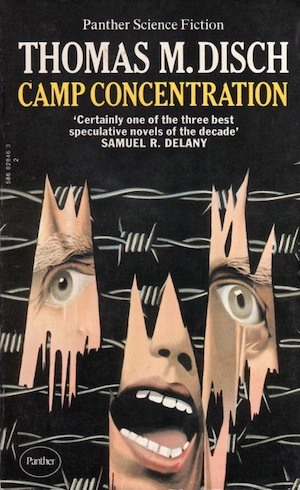
Conscientious objector Louis Sacchetti opposed the endless war, was arrested, tried, convicted, and dispatched to prison without delay or any significant public notice. When top men in President McNamara’s America take note of Louis, the bewildered poet is suddenly transferred to the top-secret Camp Archimedes.
Smarter Americans fight better wars. Or so believes General Humphrey Haast, who thinks he has the means to create smarter Americans. The General’s preferred means of intelligence enhancement is infection with a strain of syphilis that will invariably be lethal within a year.
By the time Louis discovers that enhancement is a death sentence, he has already been injected.
Science fiction is replete with bold visionaries who cast aside conventional science in pursuit of progress. The General belongs to a very special subset: he’s a nut whose pseudoscientific schemes will not produce the results he desires.
“Bounded in a Nutshell” by Charles Sheffield (1978)
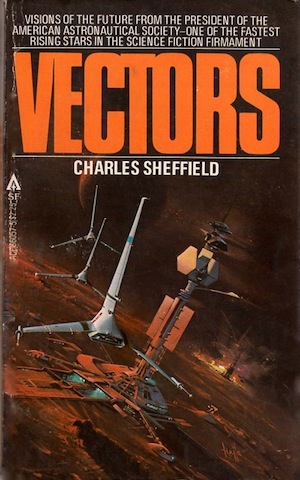
Merle Walters’ WAWD Corporation is confronted by a mystery. Kirkwood Research representatives at widely separated locations have suddenly begun exhibiting coordinated behavior without any obvious means of communication. Kirkwood is running rings around WAWD, and WAWD needs to know how.
While applied psionics is considered, the truth proves simultaneously more mundane and more alarming. Kirkwood has access to unexpected advanced computer technology, tech that provides much the same results as telepathy1—along with some even more disturbing capabilities.
Our heroes soon realized that, while it’s convenient to have a computer network a thought away, communication over long distances will be limited by relativity. The network’s immediate gratification will fail if one travels further than a few light seconds from Earth.2 Humanity, unwilling to abandon connectivity, may find itself trapped on Earth.
Beggars in Spain by Nancy Kress (1993)
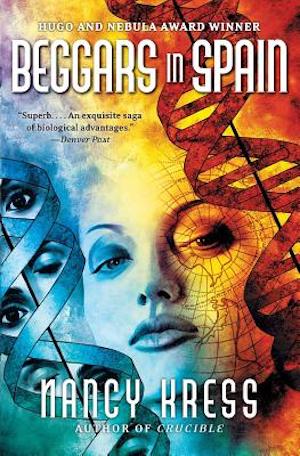
Why settle for haphazard evolution when genetic engineering can guarantee designer babies? One reason might be that one cannot necessarily foresee the consequences of such changes.
Consider what happened when scientists engineered some superior humans, who are extraordinarily bright … but also Sleepless.3 Normal adults often find it a challenge to deal with baseline babies. Now imagine bright but Sleepless babies who can cry around the clock. Caregivers collapsed, and some babies died.
When the surviving Sleepless reach adulthood, other problems appear. The Sleepless are not just free from any need to sleep, they are brighter and healthier than any unimproved kid. Given twenty-fours every day to learn and do, they are more accomplished. Why should such superlative beings burden themselves supporting their lackluster baseline relatives?
Brain Child by George Turner (1991)
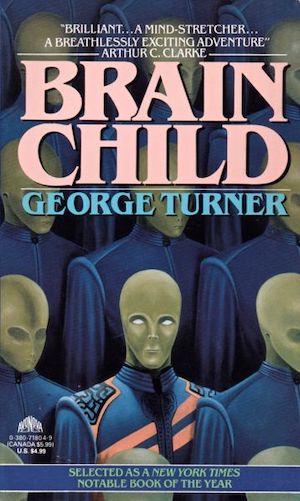
Life in mid-21st century Australia is peachy, except for overpopulation, galloping climate change, and escalating economic calamity. Only geniuses could think their way out of the trap in which Australia finds itself. In 2002, Australia set out to create some geniuses.
Decades later, David Chance is genteelly blackmailed by his heretofore unacknowledged father into investigating the so-called Nursey Children. That grand experiment produced three distinct varieties of genius: one that excelled at science (the group to which David’s father belongs), one at art, and a legitimately post-human group whose achievements could not be usefully assessed by baseline human minds. That last group died by mass suicide for reasons that remain incomprehensible, leaving behind a hidden legacy it falls to David to explore.
This novel appears to share a setting with another Turner novel, The Drowning Towers, AKA The Sea and Summer. If that is so, there is hope. The Drowning Towers makes it clear that human civilization does eventually reach a happier equilibrium with nature…long after it could matter to anyone in this book.
Black Snow Days by Claudia O’Keefe (1990)
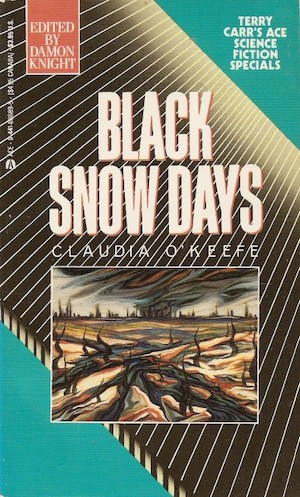
Fearing Eric Pope might take after his unremarkable father, Eric’s mother did what any sensible parent would do in her place: She used science to enhance Eric. Ungrateful Eric proceeded to demonstrate that his terrible judgement was as outsized as his genius—cue one very nearly fatal automobile crash and life-saving suspended animation.
Years later, Eric wakes to discover his body and mind were upgraded while he slept. He cannot rebuke his mother for her temerity. She and billions of others died in 2058’s global thermonuclear war. It doesn’t take long for Eric to discover that while his mother may be dead, he is still her pawn. He is the means by which she will shape the world to her will, long after her death.
The plot suggests that what Eric’s mother really wanted in her son wasn’t raw genius so much as tractability. He does have some free will, but it doesn’t matter in how things play out.
***
There are, of course, a bewildering number of works written on the subject of intelligence augmentation. These five only scratch the surface. If you have favourites I didn’t mention—yes, I see all of the Flowers for Algernon fans waving their hands for attention—comments are below.
In the words of fanfiction author Musty181, four-time Hugo finalist, prolific book reviewer, and perennial Darwin Award nominee James Davis Nicoll “looks like a default mii with glasses.” His work has appeared in Interzone, Publishers Weekly and Romantic Times as well as on his own websites, James Nicoll Reviews (where he is assisted by editor Karen Lofstrom and web person Adrienne L. Travis) and the 2021 and 2022 Aurora Award finalist Young People Read Old SFF (where he is assisted by web person Adrienne L. Travis). His Patreon can be found here.
[1]Constant connection via cell phones might also be considered something approximating telepathy.
[2]Issues of communication speed inadvertently save individualistic humans in Michael Swanwick’s “Vacuum Flowers.” The Comprise hive mind aggressively assimilates every human on Earth. Light speed issues preclude it from maintaining coherence across the Solar System.
[3]In my personal headcanon, Lawrence Block’s Evan Tanner funded the research so he’d have someone to talk to around the clock.










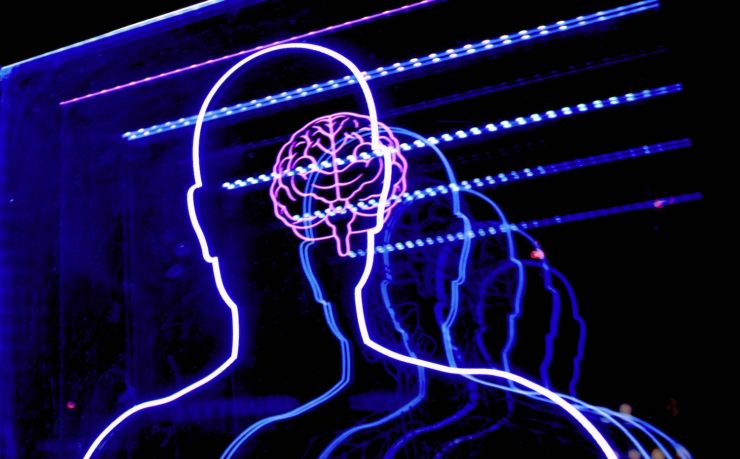
Ooo! Ooo! Flowers for — oh, rats.
Algernon was a mouse, not a rat. /s There were rats with enhanced intelligence in the Rats of NIMH trilogy, along with the mice.
Constant connection via cell phones might also be considered something approximating telepathy.
I’m reminded of the race in HHGTTG that becomes too stuck-up for galactic society, so they get cursed with telepathy.
Brain Wave by Poul Anderson. It’s an old one but a fun read. From Wikipedia
At the end of the Cretaceous period, Earth moved into an energy-damping field in space. As long as Earth was in this field, all conductors became more insulating. As a result, almost all of the life on Earth with neurons died off, causing the Cretaceous–Paleogene extinction event. The ones that survived passed on their genes for sufficiently capable neurons to deal with the new circumstance. Now in modern times, Earth suddenly moves out of the field. Within weeks all animal life on Earth becomes about 5 times as intelligent. The novel goes through the triumphs and tribulations of various people and non-human animals on Earth after this event.
Not a novel but still a nifty tale of super smarts a la Algernon but then takes off in a totally different direction – Ted Chiang’s short story ‘Understand’
@5 TS Just read “Understand” last week and it totally fits.
It’s also reminiscent of the movie and TV series “Limitless,” which were apparently based on a novel by a different author. But “Understand” also reminded me of Vernor Vinge’s 1981 novella “True Names,” where the amplification is from computer hacking, and a similar realization that there can be only one superior mind controlling the worldwide network.
Stephen King’s The Lawnmower Man
Ah, just thought of a classic: Larry Niven’s Protector, in which it is revealed humans potentially have a later stage in life that can be triggered by eating contrivium. The “Pak” stage is much more intelligent in some ways than regular humans, but highly constrained by instinct and by the author’s belief that superhuman intelligence greatly reduces the number of acceptable solutions to problems.
It’s arguable whether the Pak stage was beneficial to our ancestors, as their home world [1] is scarred by millennia of genocidal war. In the novel, the discovery of the Pak stage leads to two planetary genocides in fairly short order.
1: Yeah, this is a setting where humans are aliens and our similarity to mammals apparently a coincidence. Somewhere a biologist is crying.
@8 James, so that their descendants could enjoy your tears, ancient astronauts first planted in our DNA the seeds that would lead to Larry Niven writing about biology.
Blindsight and Echopraxia by Peter Watts. Vampires were far more intelligent than their human prey, but died out when humans discovered that crosses triggered an unfortunate neurological defect. Until 21st century genetic engineers recreate them to take advantage of their superior brain-power — what could possibly go wrong with resurrecting a race of remorseless killers who are a lot smarter than you?
What about Darwin’s Radio by Greg Bear? It’s one of my favorite tales of the next stage in human development.
Re Footnote #3,
Wouldn’t all the characters have been beautiful young women?
Macroscope – very early Piers Anthony in his hard science days, and actually got a Hugo nomination. Special project to breed and train geniuses looks like a failure because the best of them play relatively dumb. Then two of the top geniuses get to try to figure out a mindblowing piece of alien technology that will affect the future of the human race. Somewhat dated but fun.
It’s been a while since I read either of them, but I think Frederik Pohl’s “The Gold at the Starbow’s End” and its novel expansion Starburst are relevant here.
I can think of a lot of examples, but in Mackey Chandler’s _April_ series, genetic engineering babies for higher intelligence was briefly popular, until it led to some very bad outcomes… This threw genetic engineering as a whole into somewhat unwarranted disrepute. (Details fuzzy – it’s a 14-ish book series so it’s been quite a while since I read the early books).
@@.-@: I’d call Brain Wave anti-cautionary: most people are quite happy being brighter (a crew that attempts to re-create the field is treated with contempt by the author), and AFAICR no animals think of revenge for the abuses they’ve endured.
I’ve hunted for and can’t find an ancient short story (novelette?) involving giving a brain-enhancement treatment to a synthesist; an unanticipated side effect is that over time there appear to be several copies of him performing various takes — until someone asks ~”which of you did thus-and-such”, at which point they all vanish. (Thought it might have been in one of Amis&Conquest’s “Spectrum” anthologies, but none of the listed contents ring a bell.)
Another book down this line is Dennis Taylor’s “We Are Legion (We Are Bob) (Bobiverse)” where a man dies early and his consciousness is implanted into an AI in a interstellar von Neumann probe. He eventually replicates himself into hundreds of interstellar von Neumann probes as Earth fights a devastating nuclear war with a resulting nuclear winter over hundreds of years.
https://www.amazon.com/We-Are-Legion-Bob-Bobiverse/dp/1680680587/
Star Trek has been there several times, of course, with genetically enhanced humans called “Augments”, Ricardo Montalban’s gang for instance, as well as encountering an alien thingie or force field or whichever which enhances people, as in “Where No Man Has Gone Before”. The message I perceive is that sudden superhumanity is usually disastrous and a culture has to grow into it for it to be successful. In “Star Trek Deep Space Nine” there’s a hospital ward of kooky human geniuses whose medical history includes being a subject of illegal enhancement science – as we already learned of regular character Dr Julian Bashir.
David Brin’s Uplift books come to mind here.
“In Hiding”, later expanded to The Children of the Atom, by Wilmar Shirras.
20 To which the X Men owe not a small debt….
It is so wicked hard to convincingly portray a smarter than human character. Most of the stories in this vein that I have found convincing are from viewpoints other than the enhanced person.
John Barnes’s Mother Of Storms, in which a character is collecting comets from the Oort Cloud to put in some kind of orbit around Earth to reduce heat from the sun and impact on climate change – it made sense in the book – and is also mentally linked to the computer in his ship. He realises that the only way that the mission will succeed is if it travels faster, but the g-force will kill him, so he uploads himself into the ship, thus negating the need for a human pilot. He also collects satellites and machinery along the way, turning himself into some kind of robot Kaiju. Coincidentally, his estranged wife is involved in the same sort of research and is murdered while engaged in similar work and her own consciousness is similarly enhanced, finally making their marriage work properly… There’s a lot of similarities to Brin’s Earth, which came out a couple of year’s earlier and is a clear influence. As an aside, I initially thought it was an excessively violent and misogynistic work, but as we approach Barnes’s future of 2028, I don’t think he was terribly far off the mark in some ways.
Olaf Stapledon’s Sirius sort of counts, although the enhanced individual was a dog.
Roger Zelazny’s The Dream Master also had an enhanced seeing-eye dog. As I recall, he didn’t particularly enjoy being enhanced.
Brunner’s Stand on Zanzibar had an enhanced orang-utan that featured in passing, mainly because it was enhanced enough to commit suicide.
“None so Blind” by Joe Haldeman. It’s available as a free read online, and it’s in one of his story anthologies.
ISTR a series of stories in I think in the 70’s Analog magazine about a device that you wore and it interfaced with your brain and boosted your effective intelligence.
The only story I remember was about a case where an artist accused another artist of stealing his art style via the device. What happened was the Artist A lent his brain enhancer to another artist, Artist B, who painted several works that were a melding of his style and Artist A’s style. The protagonist hadn’t used the device and gave it whirl and found that his tone deafness was “cured”. I don’t remember who wrote it, but hopefully the groupmind will remember.
Lois McMaster Bujold’s Cetaganda is a whole society devoted to enhancing everything about humans — not just intelligence but physical strength and beauty, emotions, the works.
@27 I remember two of those stories (I thought in fact that there were only two). The character who was tasked with judging whether the technology could be used by the general populace was the person who could suddenly understand music after using the tech (music had just been noise or sounds to him before that) and the revelation definitely swayed his decision.
I believe the stories were published in Analog during Schmidt’s tenure. Beyond that I have nothing helpful to add.
27 I believe it is the Pocket Brain series by Rob Chilson.
@28
At least among the aristocracy; I don’t think we ever meet a Cetagandan who isn’t haut or ghem caste. The haut are extremely creepy, and the ghem are mostly jerks. It’s not clear what the experience (or genetic makeup) of the ordinary Cetagandan in the streets is.
_The Divide_ by Robert Charles Wilson is a great one… A meditation on what it means to lose that capability, not just or even mostly for oneself, but for those around you. Very personal tale of intelligence enhancement gone wrong.
This may be a bit of a stretch but in R.A. Heinlein’s “The Puppet Masters”, human beings become “enhanced” through a symbiosis with the parasitic Titan’s. These “slugs” are physically primitive but consist of nearly 80 percent neural matter thus making them mostly brain. I’ve often dreamed of expanding on this basic premise to have the humans reach an accord with the Titans and thus form a partnership that allows for an elite corps of super intelligent physically enhanced hybrids. Then, of course, there is that wonderful old movie featuring Natalie Wood’s swan song performance with Christopher Walken, “Brain Storm”. Still, for repeatedly plowed ground one need look no further than “The Outer Limits” with entries like “The Sixth Finger”, “The Man with the Power”, “The Children of Spider County”, “The Special One”, and my favorite, “Expanding Human”.
There is the “Long Earth” series by Terry Pratchett and Stephen Baxter, which, apart from dealing with humanity discovering the existence of multiple Earths, comparatively easily accessible by us, also deals with the appearance of numbers of hyper-intelligent children, who become collectively known as the “Next” (there is nothing to indicate whether there is any connection between the discovery of the multiple Earths and the emergence of the Next). The novels go into some detail regarding the increasing friction and conflict between the Next and “ordinary” humans – each of the two groups being concerned for their continued existence – and ending with the Next bringing the conflict to an end by taking themselves “elsewhere” – at least for the moment.
John Brunner’s The Stone that Never Came Down; a scientist develops a virus that enhances the connectivity of the brain so that what someone knows can’t be forgotten or ignored, thus curing conservatism
@30 That’s the series! Thanks for remembering that! Wrong decade, I thought it was the 70s. Ah well, I’m getting old.
@28, 31,
I don’t think there’s a Cetagandan level below haut or ghem- except for ba. The rather gormless Cetagandan in Gentleman Jole and the Red Queen has a family in plumbing supplies.
@25 — but Odd John, also by Stapledon, does cover a race of superior-intellect children.
And I find it hard to believe that nobody, thus far, has mentioned John Wyndham’s The Midwich Cuckoos (filmed as Village of the Damned for some reason).
Also, Edmond Hamilton’s (very) early story “The Man Who Evolved,” as displayed in Asimov’s Before the Golden Age.
For a broad enough definition of “intelligence” — i.e,. information gathering — what about X: The Man with X-Ray Eyes?
“Roger Zelazny’s The Dream Master also had an enhanced seeing-eye dog. As I recall, he didn’t particularly enjoy being enhanced.”
The whole premise of André Alexis’ Fifteen Dogs. Two Greek gods bet whether dogs would be happier if they had human intelligence. Not particularly.
@37: The existence of the poor fortune-teller who was turned into Terence Cee’s ancestor suggests that there is a Cetagandan underclass, presumably unenhanced.
A more recent one is The Terraformers by Annalee Newitz. Enhanced animals, humans, hominids, etc abound. There’s a major plot point involving the terraformed world at the center of the story being for people who have/use “baseline” human bodies instead of the various engineered hominid types, or animals, or robots, or etc., But some of the protagonists muse that even those people aren’t really baseline, because they have nanotech and brain enhancement and etc., and really, who would want to be a genuinely baseline human?
@37
The Barrayarans certainly perceive the ghem to be a sort of aristocracy, but that might be their own prejudices and habits talking.
@40
ISTR they found the fortune-teller elsewhere, possibly Earth or Jackson’s Whole
sturgeonslawyer@38: It was originally a US production, and no doubt they figured that Unistan audiences wouldn’t know what a cuckoo is or does.
And, as long as nobody else seems to have mentioned it, how about the children in Clarke’s Childhood’s End getting something of a mind-boost from the Overmind?
See also Robert Heinlein’s novella “Gulf” (1949), where a government agent is recruited by a secret society of “New Men,” those with supposedly advanced intellects (and some apparent psionic powers), who see themselves as the “next step” in human evolution. He’s told they are to marry and reproduce to further this evolution, and will eventually supplant the “Common Man.” In the meantime, they will “weed” the human race by eliminating those who, in their judgement, are or will be a danger to society, but who may not have actually committed crimes. It’s hard to tell if this may actually be a satire of the kind of eugenics-based SF that was common at the time; if not, it’s an especially bleak look at the human race and the idea that advanced intellect does not mean advanced ethics or morals.
It should be noted that this novella is congruent with the novel FRIDAY, in which there is passing mention of the “New Men” taking off for the stars to colonize their own world.
@42 – Cuckoos are found in North America – 3 species. And they behave like Old World cuckoos.
Raskos@44: Yeah, you know that, and I know that, but does Hollywood know that? And, more to the point, do they know that anyone else knows?
@45 – There’s no knowing what Hollywood knows, but the cuckoo as a symbol for infiltration isn’t uncommon here.
In actual fact George Turner’s Brain Child doesn’t share the same future history continuity as The Sea and Summer (aka The Drowning Towers). It does fit into the sequence of his novels that followed it. These are The Destiny Makers, Genetic Soldier and Down there in Darkness. Altogether they constitute a tetralogy. One of the proper kind as the four novels can be read in any order; so it’s not a serial in four parts.Turner himself stated the climate crisis in Brain Child and, hence, in the subsequent novels was milder than that in The Sea and Summer. Yes in the further future, beyond the events of Brain Child, nature and humanity are in better balance.
Also, Brain Child is an expansion to novel length of a novelette “On the Nursery Floor”, originally published in Strange Attractors (edited) by Damien Broderick who commissioned it as a story on the concept of a Superman. Reprinted in the collection Pursuit of Miracles (1990) which is available as an e-book as are all of George Turner’s science-fiction novels.
43 – There is also Heinlein’s “Beyond This Horizon”, describing a future society in which genetic engineering of humans is commonplace, but is constrained by not going beyond the “natural” biological potential of each person. At one point, the principal character is talking to a friend of his, who is rather annoyed. Up to this point, his friend’s family had been opposed to genetic engineering. However, having recently married, he and his wife have decided that their children should not be denied the advantages GE offers their potential children – stronger, brighter, faster – in the same way it does others.
Unfortunately, having undergone genetic analysis, they have been told that the analysis indicates that they are already close to the maximum potential their genetic structure allows – their children might be freed from one or two minor allergies, but that is all – leaving the parents somewhat dissatisfied.
On the other hand, at some point in its history, this society battled a rival – “The Empire of the Great Khans” – which practiced “all-out” genetic engineering, tailoring each individual to fit exactly into their place in society – “super-soldiers” and so on.
As it turned out, Heinlein’s “society” defeated the Great Khans, indicating that there is something to be said for a restrained approach, however annoying some people might find it.
@38 says: And I find it hard to believe that nobody, thus far, has mentioned John Wyndham’s The Midwich Cuckoos (filmed as Village of the Damned for some reason).
I think the reason no one had mentioned it was because it doesn’t fit the model. The Midwich Cuckoos aren’t an example of enhanced human intelligence. As the title suggests, they’re members of a hyper-intelligent alien race planted in human wombs to be birthed and nurtured by human parents. They aren’t uplifted human children.
Oops. Sorry about the confusing sentence. Bad editing on my part. In @49 I said As the title suggests, they’re members of a hyper-intelligent alien race planted in human wombs to be birthed and nurtured by human parents.
I should have said: “The ‘children’ of the story are members of a hyper-intelligent race planted—as the title suggests—in human wombs to be birthed and nurtured by human parents.”
Heinlein’s “Friday” was mentioned in another context, but something that’s often overlooked in commentary on the main character’s augmentations is her heightened intelligence… that’s part of what makes regular people fear & hate “APs.” Some of the angst commented on there is similar to what we’re seeing about ChatGPT now.
Ramez Naam’s Nexus trilogy explores nanotechnology that enhances human brain capacity, and features at least one posthuman character – definitely worth a read.
“Bookworm, Run!” – Vernor Vinge,1966,about a chimp who has a) human intelligence, b) speech, and c) a direct brain connection to the main USGOV databanks.
Daniel Keys Moran’s “Continuing Time” series starts with genetic engineering of humans, in Emerald Eyes, and continues with augmentation by implanting processing hardware, and later, externalized hardware, to the point where one human protagonist is the most powerful “replicant AI” in the solar system, when its human component is hooked up to the external hardware (the Black Beast).
1000 years later, in his latest novel, The Great Gods, you see the impact of a millennium of increasingly sophisticated genetic engineering, to the point where modern humans think so much faster than “leftbehind” humans that they can encrypt their speech in realtime, and other fun tricks, and have language that is beyond the comprehension of leftbehinds. Not “a language you haven’t learned yet”, but “a language that your brain is incapable of learning”.
I don’t remember that the Cuckoo children are individually or collectively hyperintelligent. Although they start causing trouble as babies.
A famous American book and film that I haven’t consumed refer to a cuckoo’s nest in the title, and I think I was “today” years old when it crossed my mind that cuckoos don’t make nests. Perhaps that point is made in the story?
A different book, “The Krugg Syndrome” (invasion by psychic trees), and I suppose whichever Known Space story has the Slaver in, I think represent an argument that a species that has awesome psychic powers tends to be not especially smart as well. You don’t need to be smart, you just use your awesome psychic powers.
I disliked Stephen Baxter’s “Time” for several reasons, and so may you, but it also includes strange random births of Slan children, whom ordinary humans isolate and educate and the children are smart and probably psychic and, I think this isn’t a spoiler, ungrateful.
From fading memory Wally K. Daly’s occasionally repeated British radio play series, three, starting ominously with “Before the Screaming Begins” has an alien force enhancing a handful of humans for sinister purpose, taxation or extinction or both, but the enhanced humans generally are against the aliens, while unenhanced humans nevertheless decide to shoot the enhanced ones on sight. That is surprisingly difficult. They have incredible unconscious power. Enhancement is either hereditary or teachable or transferable, which may be the alien plan or be a big problem with it, and a lot of enhanced children are in the next story. I think they also can fly.
@41: Thanks
Greg Egan’s “Eugene” is about people contemplating having a child with especially enhanced children. Things don’t work out.
Frederik Pohl’s GATEWAY books end up with people being ‘vastened’ by being uploaded to AI networks (anything to avoid the hero’s whining!).
@57: vastening (of both mind and body) is also an option, at least for certain individuals, in David Zindell’s Neverness series, at least one of whom, iirc, has become a god as a result (it has been a very long time since I read them, so I may be getting muddled).
The geneticists who created the ler in Foster’s Gameplayers of Zan were aiming for enhanced, smarter humans but ended up with something different…
James Alan Gardner’s They Promised Me the Gun Wasn’t Loaded has someone gain a superpower that gives them human-maximum intelligence. Excellent book. Series is well worth a read or two.
Austin Grossman’s Soon I Will be Invincible has one of its main characters get Malign Hypercognition Disorder. He can invent all kinds of super-tech with ordinary stuff, but is fixated upon conquering the world.
OK, there’s a book I read in junior high — so, circa 1973 — 1975. Setting is the present or near future. Some dude is the voluntary subject of intelligence enhancement experiments. But something goes wrong. The dude escapes from the research facility and is sought and pursued by the researchers. (The story is told from the latter’s point of view.) Somehow he is a threat.
Near the end, the dude transforms into a large white big-brained creature with spider-like limbs. The researchers determine that he has transformed into the next stage of human evolution. I forget how things end up exactly, but the evolved superbrain guy does not survive.
Anyone know what this SF novel might be? The title was something like The Programmed Man or The Terminal Man, but does not match the descriptions of any books by those names that I’ve found online. The Terminal Man by Michael Crichton comes close, but doesn’t have the enhanced guy evolving into a giant white brain-slug with spider-like limbs at the end.
They weren’t Homo sapiens, but they were our ancestors, and Moon-Watcher’s tribe got a bit of the intellectual enhancement from that monolith in 2001: A Space Odyssey.
Come to that, Dave Bowman got his own enhancement at the end of the film as well.
The Honor Harrington books by David Weber take a turn from the Napoleonic Wars into galaxy-spanning conspiracies instigated by genetic super people who were <spoiler>unwilling to accept the limits on genetic engineering the rest of the galaxy agreed to.</spoiler>.
This bit sounds somewhat reminiscent of River Tam from _Firefly_, although IIRC she was naturally extremely intelligent going in, so it’s questionable whether she really fits the category or whether all the actual enhancements were in other abilities.
River isn’t beyond emotional attachment to more normal humans around her, which makes her story less bleak than a lot of this thread (despite it not being an especially cheerful setting overall).
The sleepless in Beggars in Spain reminds me of Jonathan Letham’s Gun with Occasional Music, a parody of a hard-boiled detective story set in a very odd future. Babies are all enhanced to have super-fast cognitive development, referred to as Baby-heads, which has the side effect of being very unpleasant, leading baby-heads to be very cynical, independent, and prone to spend a lot of time in baby bars, getting drunk to dull their hyper-intelligent minds. Since the human babies are so cynical, independent, and drunk, people raise enhanced animals as children. It’s not the most serious of novels.
Vinge has a number of examples of enhanced intelligence, including the “Focused” humans in A Deepness in the Sky.
@63 this reminds me a bit of Casey Agonistes by Richard McKenna , and in another way of the backstory of King’s Firestarter.
@43, In Friday Baldwin (Friday’s father figure) seems to strongly disapprove of the New Men, although he was their leader in “Gulf”. He restricts her inheritance so that it cannot be used to emigrate to the world they have settled. In Friday a major point is made that “It takes a human mother to bear a human child” which directly contradicts the assertion in “Gulf” that the new men are a new species.
@11 I hated Darwin’s Radio, because it badly misstates how evolution and mutation work.
Howard Fast’s “The First Men” has a whole community of children so raised as to have enhanced abilities.
Many of the characters, including the VP narrator, in David Palmer’s Emergence are enhanced apparently through viral infection of their grandparents. Got a bit over the top at the end IMO, up till then an enjoyable book.
No one felt like bringing up Lensmen? A very long project to genetically enhance some races through selective breeding, resulting in The Children of the Lens.